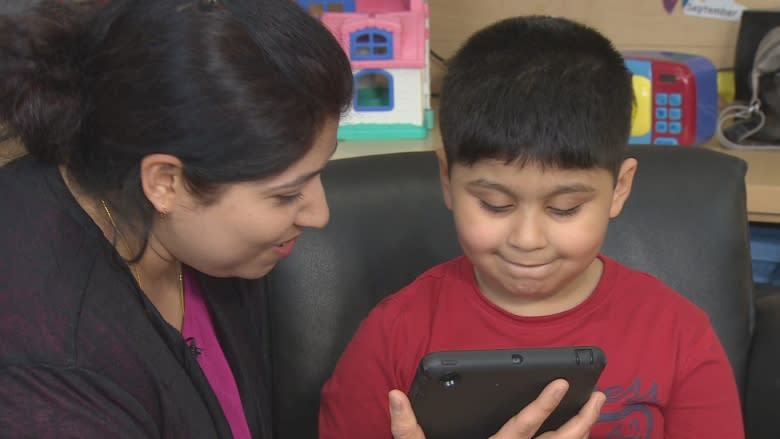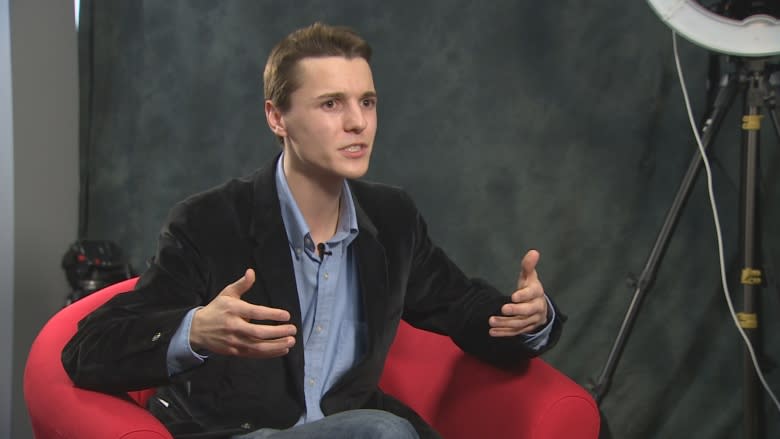'It's about time': Families praise Sesame Street's new character with autism
A slow grin grows across five-year-old Zain Syed's face as he curls up on a couch next to his mother.
His eyes are glued to an iPad displaying something he's never seen before: a Sesame Street muppet with autism, who is flapping her arms just like he does.
"She is just like Zain, the same type of behaviour," explained his mother, Annie Fayyaz. "I like her."
Julia is a green-eyed four-year-old with bright red hair, a knack for song lyrics and an aversion to certain loud noises.
"It's about time that someone thought of this idea," said Fayyaz, after watching a pre-released clip from the show.
'A sense of pride'
The character launched Monday on PBS's Sesame Street. The show spent five years consulting autism experts to create the first muppet with autism.
Julia made her debut online in 2016, accompanied by a digital storybook, website and educational app — all aimed at normalizing autistic behaviours for children.
"What brought this to light was really the incidence of autism here and the frequency," said Jeanette Betancourt, Sesame Workshop's senior vice-president of U.S. social impact.
"So it was the right time, and doing it well ... is why it took us over five years of research to actually bring Julia to life."
Julia is less verbal than other characters and sometimes doesn't respond or make eye contact when spoken to.
"It's a fantastic thing," said Shelley Brazier, a senior therapist at Toronto's Geneva Centre for Autism. "It gives [children with autism] a sense of pride, that they can see themselves in a positive light on television."
'They aren't weird'
For those in the community, the move signals a shift the entertainment world's approach to autism.
Michael McCreary, a standup comic with Asperger's, a form of autism, praised Sesame Street's departure with Julia — but warned there are no catch-all autistic traits.
"I think by presenting that to kids between four and six, around that age, they start to recognize that they aren't weird," said McCreary. "That's part of neurodiversity, that's just another person's way of going about things."
Characters with autism have a history in movies: in Rain Man and I Am Sam, for example, or more recently, The Accountant. But experts and people with autism claim Hollywood too often only shows the clichés or stereotypes associated with the disorder, instead of the real struggles faced by people living with it.
"The problem with The Accountant and films along those lines is that they recognize difficulties with being on the spectrum, but then they give them a superpower to negate that," said McCreary. "I think that's kind of condescending."
The answer, according to McCreary, lies in consulting people who know autism best. A film buff himself, he has worked with television productions to portray the disorder more accurately, and works to shed light on what it's like to live with autism through his comedy.
"We need more collaboration with self-advocates," he noted. "And also, we just need more things created by self-advocates."
'Impossible to portray'
Another self-advocate is taking YouTube by storm, with possibly the first-ever talk show hosted by a woman who doesn't speak.
Carly Fleischmann, a 22-year-old from Toronto, communicates through a computer program that voices what she types.
In her YouTube show Speechless, she interviews celebrities. A 2016 interview with Hollywood star Channing Tatum went viral last year, racking up 3.7 million views.
Now she's landed a deal with CBC and Fine Brothers Entertainment to continue to produce monthly episodes.
"I think it's important as a society that we continue to showcase what people with autism can do," said Fleischmann.
She described autism as "impossible to portray" because it presents so differently in each individual. But she praised Sesame Street's Julia.
"I wish I had this Sesame Street character when I was growing up," said Fleischmann. "There might have been more acceptance of me when I was trying to integrate into typical classrooms, and it might have helped me in making friends."
Fleischmann added that she hopes the show will teach children that people with autism have something to bring to the table. And she said she believes that lesson will "have a ripple effect" that will continue to shape children's views of the disorder for generations.
Julia's entrance is timely.
Children in Canada are increasingly being diagnosed with autism. It's now the most commonly diagnosed neurological disorder in the country. According to the National Epidemiological Database for the Study of Autism in Canada, one in 94 children between six and nine years old are on the spectrum.



